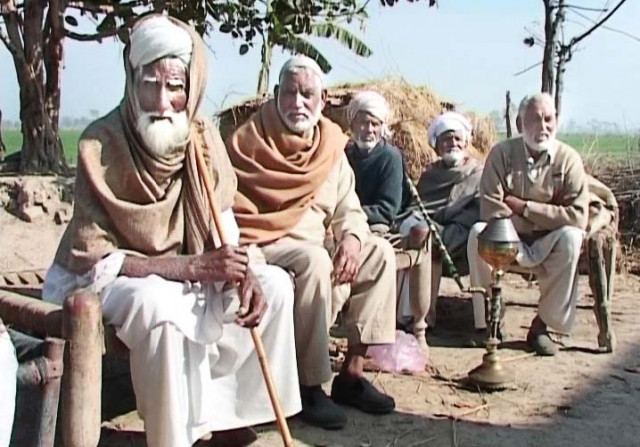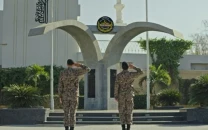SC orders provincial governments to introduce welfare reforms for elderly
Ruling stresses that Pakistan's constitutional framework 'places the family at the heart of social life'

The Supreme Court has directed the provincial governments to take concrete measures for the welfare and protection of senior citizens, underscoring the constitutional obligation to safeguard family life, dignity and social security.
In a nine-page judgment written by Justice Salahuddin Panwar, the Supreme Court instructed the Sindh government to establish and ensure the effective functioning of protection committees in every district within ninety days, as required under Section 19 of the Sindh Domestic Violence (Prevention and Protection) Act, 2013.
The court also directed the Punjab government's law and parliamentary affairs department to review this matter, take necessary action and introduce a senior-citizen welfare code that includes a council fund and a simple maintenance tribunal.
The verdict came during the hearing of a property dispute between a father and his children.
According to the case record, the complainant — a retired medical doctor and senior citizen — alleged that his two adult children, a daughter and a son from a dissolved marriage, had unlawfully dispossessed him of his house at 24-B, Sunset Boulevard, DHA Phase-II Extension, Karachi.
He maintained that even though he had provided financial support for the petitioners' education both in Pakistan and abroad, they eventually became abusive towards him and forced him out of his own residence.
The father filed a complaint before the additional sessions judge Karachi South under Section 3 of the Illegal Dispossession Act, 2005, following which bailable warrants of arrest were issued against his children. The petitioners challenged the order in the Sindh High Court (SHC), which dismissed their plea, leading them to approach the SC.
A three-member bench led by Justice Muhammad Hashim Khan Kakar framed the question of whether "a complaint under section 3 of the Act, 2005 can be maintained in a familial, permissive-possession setting between a father and his adult children, absent clear material indicating mens rea to dispossess, grab or unlawfully occupy".
The judgment observed that the Act was a "special penal statute intended to protect lawful owners and occupiers from forcible dispossession and land grabbing by unauthorised persons".
It clarified that its application was not limited to so-called "qabza groups or land mafias," but extended to any person who forcibly intrudes upon or controls another's property "with the intention to dispossess, grab, control or occupy".
The ruling stressed that Pakistan's constitutional framework "places the family at the heart of social life," with Articles 9 and 14 guaranteeing personal security and dignity, Article 31 obligating the State to enable Muslims to live by Islamic injunctions, and Article 35 commanding protection of the family, the mother and the child.
"In our collective, not individualist, social fabric, the home is a site of mutual care, interdependence and trust," the judgment stated, adding that "Islamic law and ethics accord the highest status to parents and the elderly and enjoin kindness, respect and service to them. Penal statutes must, therefore, be applied so as to deter abuse without splintering family unions or criminalising ordinary frictions within them".
The court cautioned that "to deploy the IDA 2005 in a permissive, fiduciary household setting risks over-criminalisation and distorts the statute beyond its text, purpose and spirit".
It also referred to the Sindh Domestic Violence (Prevention and Protection) Act, 2013, noting that it defines an aggrieved person broadly and secures, through Section 9, the right of residence of women, children or other vulnerable persons in a shared household.
"Section 19 mandates Protection Committees at district level with multi-disciplinary membership including psychology and social welfare expertise," the judgment observed, adding that "implementation of the section 19 of the Sindh Domestic Violence (Prevention and Protection) Act, 2013 remains uneven."
The judgment reiterated that "the Government of Sindh shall ensure that Protection Committees are fully constituted and functional in every district, with psychologists and psycho-social workers included, and that their referral pathways are activated so that families are supported and vulnerable persons safeguarded without resort to over-broad penal process".
It further noted that while the Islamabad Capital Territory Senior Citizens Act, 2021 exists, "the provinces bear the primary responsibility for social protection".
"Domestic-violence frameworks are uneven in their protection of vulnerable persons," the ruling continued, explaining that Sindh and Balochistan define "aggrieved persons" broadly to include any vulnerable person, while Punjab and Khyber Pakhtunkhwa restrict protection largely to women.
"Sindh and Khyber-Pakhtunkhwa have long enacted senior citizen statutes, and Balochistan has followed suit, while Punjab has to date only tabled a Senior Citizens Welfare Bill," the judgment stated.
"These divergences lead to protection turning on geography rather than need and invite a principled harmonisation that respects provincial autonomy yet secures a baseline of dignity for the elderly and other dependants."
The court said it was "constitutionally appropriate and administratively imperative" for the Punjab government to consider two complementary approaches — "first, widening the definition of aggrieved person in its domestic-violence law to include any vulnerable person, thus allowing swift civil-protective relief for dependent elders within the household sphere; and secondly, enacting, on the lines of the Punjab Senior Citizens Welfare Bill, 2025, a rights-and-maintenance statute that creates a dedicated council, a modest welfare fund and a simple, summary tribunal for parental maintenance and care".
The judgment further stated that such legislation should "provide notice-based, conciliatory procedures, calibrated orders for residence, maintenance and care plans, quick enforcement, and penalties that are civil in the first instance, reserving criminal sanction for contumacious non-compliance".
"This approach would align with Articles 9, 14, 31 and 35 of the Constitution and with our collective ethos that venerates parents and protects family life," the court added.
Copies of the judgment were ordered to be sent to the law departments of Balochistan and Khyber Pakhtunkhwa through their chief secretaries and advocate generals "for information and any analogous measures they may deem appropriate".




















COMMENTS
Comments are moderated and generally will be posted if they are on-topic and not abusive.
For more information, please see our Comments FAQ